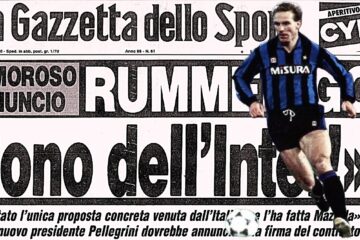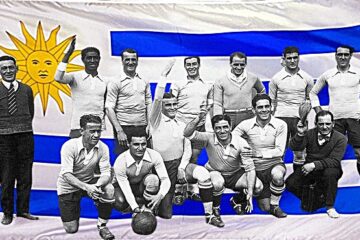Shocking World Cup Moments | Korea’s victory over Italy in 1966 and the other side of the coin!
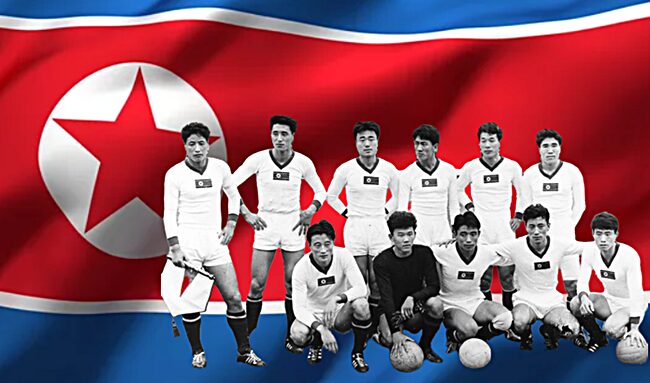
Prologue!
There are many reasons why football has grown to become the most popular sport in the world. The simplicity of the game means it can be played by almost anyone, anywhere. It’s incredible fan bases have helped create an atmosphere that is unmatched, but it is undoubtedly the unpredictability of the sport that really sets it apart.
By researching and investigating the most shocking cases and unbelievable events, we will talk today about one of these cases. The victory of the Korean Democratic People’s Republic of Korea against Italy (1-0) in the 1966 edition played in Middleborough. We will also discuss the other side of the coin, the shocking fate of the North Korean team in this World Cup, who were sent to the Gulag and tortured after going from heroes to zeros!
It was one of the biggest upsets in the history of football – isolated and war-damaged North Korea knocked European powerhouse Italy out of the 1966 World Cup, perhaps one of the most incredible stories on the pitch, but it is claimed to have been followed by one of the most horrifying twists off the field in the history of the World Cup.
1.
The 1966 World Cup is one of the most discussed, dissected and analyzed tournaments in the history of sport. A truly ‘national experience’, it was the first edition of the competition to feature extensive coverage on television and in the wider media.
The 1966 World Cup reflected the changes in wider society and helped to reinvent the image England, and the wider UK had created for itself. If, for English fans, the tournament holds an incredible reverence, the same can be said for those in North Korea.
North Korea is by no means known for its footballing prowess. Indeed, when googling the country, the most common searches involve human rights violations, war with the South and troubled relations with the West.
In 1966, the nation was still in its infancy. A communist dictatorship had emerged following the Second World War, with the brutal Korean War splitting the peninsula in two during the early 1950s. Sport had emerged from in North Korea as a means to promote ideologies and ‘one-up’ their neighbours to the south. Such an impetus on the North Korean football team was no ‘sudden occurrence’ as the nation tasted victory 29 times out of 30 before the 1966 World Cup.
In 1966, North Korea became the first Asian team in history to progress beyond the first round just 13 years after the end of the bloody and devastating Korean War. And while their glorious victory should have been as celebrated as England winning the 1966 title in the final tie against Germany – it is claimed they did not return as heroes.
Instead the brutal regime are claimed to have savagely punished their players for bringing shame on the country after being knocked out in their next game 5-3 against Portugal.
We will return to this fact a little later in this article. But first, we will show the Korean team in this World Cup and their performance.
A single goal from a 22-year-old winger called Pak Doo-ik made football history on July 19, 1966.
The secretive nation had qualified for the tournament after a play-off victory over Australia. A 9-2 aggregate scoreline, was helped by ‘meticulous preparation’ providing their fledgling nation with a major propaganda boost. Perhaps even more incredible was that their presence at the finals was helped in part by the widespread boycott of the competition from Africa (CAF), Asia (AFC) and Oceania (OFC). The confederations were frustrated at the lack of representation offered at the Euro-South American centric World Cup. With only one place offered between the three confederations, it is understandable as to why.
When DPR Korea arrived in England no Asian team had ever advanced beyond the Group Stage, won a match or even scored a goal at the FIFA World Cup finals, and no Asian nation had even appeared in the tournament since Korea Republic until 1966.
Completely unknown to the football world outside of the Australian team they comprehensively beat over two legs in order to qualify, Myung Rye-hyun’s DPR Korea side weren’t expected to challenge the more established nations in England, and the draw did them no favors.
Arriving at the World Cup, the North Korean side was met with immediate suspicion. Described by the Daily Mirror as ‘Mystery Men’, a number of further newspaper articles can be found concerning North Korea’s anger at the state of their training facilities in Middlesbrough.
In comparison to other competing nations, North Korea had little to no support following them in England. The Sports Argus, however, was more akin to the abilities possessed by the 1966 World Cup’s sole Asian representative. Highlighting their impressive record (at least in Asia) and the strict discipline instilled in the squad, they would be no pushovers. Moreover, their ‘discipline, resolve and accuracy in passing would be hard to match’
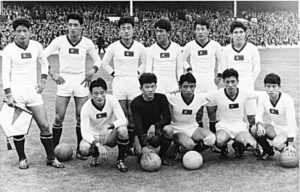
The Koreans faced an exceedingly difficult group featuring 1960 European Champions and 1964 runners-up Soviet Union, Chile who finished third in the previous World Cup – and two-time World Champions Italy, who were expected to engage in a three-way battle for the two quarter-final places.
DPR Korea kicked off their campaign at Middlesbrough’s Ayresome Park the venue for all their group matches against the Soviet Union and were well beaten by a seasoned international team.
Despite some promising attacking play from the Koreans, the Soviets scored twice before half-time and added a third late on to secure a 3-0 win.
In the second match against Chile, the Koreans showed improvement but still trailed 1-0 at half-time. Needing a result to stay alive in the tournament, and with the backing of the 14,000 Teessiders, DPR Korea’s captain Park Seung-zin lashed home a fierce volley in the 88th minute to secure a much-needed
draw. 1-1!
Park’s goal made history in itself it was Asia’s first goal and won Asia’s first point in a FIFA World Cup and gave the Koreans an outside chance of advancing to the knockout stage but standing in their way were the Italians.
Italy had started the tournament impressively by inflicting a 2-0 defeat on Chile, but stumbled against the Soviets, losing 1-0, and came into the match against DPR Korea needing a draw themselves to progress to the quarterfinals.
Despite their draw against Chile, DPR Korea were given little hope of beating a side that included stars like AC Milan’s “Golden Boy” Gianni Rivera and Internazionale duo Sandro Mazzola and Giacinto Facchetti, who had both won back-to-back European Cups in 1964 and 1965.
2.
The Italian coach, Edmondo Fabbri had warned that his side ‘had lost faith in their ability’ and were ‘frightened by failure’. Further adding that attack was to be the form of defense, Fabbri was weary of the threat posed by North Korea.
Just under 18,000 supporters would be in attendance at “Ayresome Park” to watch the two nations battle it out for a place in the last eight. After a cagey opening in which Italy showed glimpses of quality, in particular through the skill of Gianni Rivera, the Azzurri would lose their key man and captain, Giacomo Bulgarelli, to injury. With substitutions only being introduced to the World Cup four years after ’66, Italy was to play the rest of the game with only 10 men.
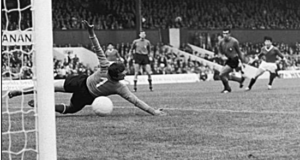
Against all the odds, Pak Doo-Ik’s 42nd minute goal would win the tie for North Korea. Slottinng the ball into the bottom left corner, Doo-Ik had shown remarkable composure in front of goal. With only ten players, the Italians couldn’t match the energy and pace of the Koreans, being ‘out-run to death’ in the process.
It was, at the time, arguably the greatest shock in World Cup history. Described as ‘unglamorous, unfancied and unknown’, North Korea had delivered at the highest level.
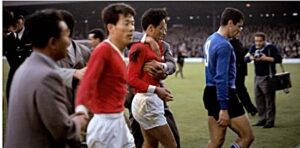
The newspapers of the day in England will make a big fuss about this victory on their pages. The Daily Mirror would comment that the result was a ‘soccer sensation’ and comparable with the USA’s 1-0 triumph over England in 1950.
The Koreans had won the hearts of the host nation and by the time they met Eusébio’s Portugal in the quarterfinals, they were indeed the most supported nation left in the competition (except England of course).
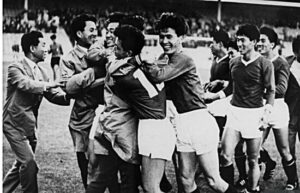
For the Italians, the defeat led to major questions being asked across all levels of the game.
In the quarterfinals, despite North Korea racing to a 3-0 lead, Portugal would come back into the game and eventually defeat the North Koreans 5-3.
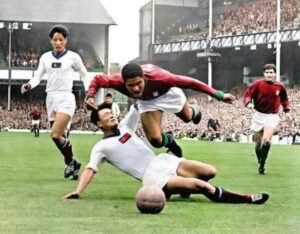
The influential Eusébio was key to the triumph, scoring four goals at Goodison Park. Although exiting the tournament in the last eight, the Korean side had done more for its country’s global image in four matches than had been achieved through politics in the years before and after the 1966 World Cup.
It shows the power football can have in changing opinions, opening previously closed minds and bringing people together from every corner of the world.
What happens next is perhaps even more shocking.
3.
Team`s antics were judged bourgeois, reactionary, and corrupted by imperialism and bad ideas
Members of the Korean team are claimed to have returned to Pyongyang facing damnation – being sent to the gulags, by then North Korean leader Kim Il-sung.
It is a claim which has been disputed over the years – dismissed by some as “Cold War propaganda”.

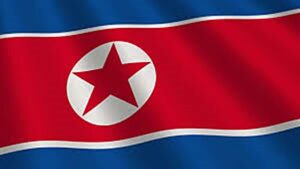
Surviving members of the team in North Korea have publicly denied they were banged up in the camps and claim they were still celebrated.
But respected North Korea defector and journalist Kang Chol-hwan claims first-hand in his book The Aquariums of Pyongyang that he met one of the players in the infamous gulag Yodok.
Kang claims all thoughts of their 1966 football glory had faded – and the entire team aside from Pak Doo-ik, who scored the winner against Italy, had been sent to concentration camps.
He says they were subject to decades of torture and starvation.
Returning home, Kang claims they were considered disgraced and sent to the prison camps.
It is claimed the team had gone out drinking two nights before their match against Portugal – and were still feeling the effects when they arrived at Goodison Park. Kang also says the team had been seen out in public “carrying on” with local girls – something which reached the ears of the strict regime back home. And these actions were deemed as “decadence” and not becoming of one representing the Dear Leader.
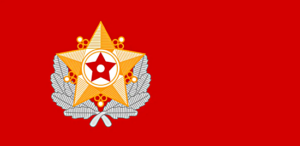
“In Pyongyang, the national team’s barroom antics were judged bourgeois, reactionary, and corrupted by imperialism and bad ideas,” wrote Kang.
“Upon arriving back in Korea, the whole team save for [Pak] – who was suffering from stomach pains on the night of the party, was sent to the camps.”
Kang claims he met with Pak Seung-zin, who scored against Chile, inside Yodok – a prison camp which is reserved for political prisoners and is officially known as Labour Penal Colony Number 15. He claims the footballer was famous amongst prisoners for his ability to endure torture. And he was nicknamed “The Cockroach” – as he used to gobble up bugs. Pak later denied he was ever sent to the prison camp.
“His celebrity won him few favors in Yodok, as he discovered when he was caught stealing nails and cement from the camp’s construction materials shop where he worked,” claims Kang. “He denied all wrongdoing and lashed out at the accusing guard. His punishment was a three-month stint in The Sweatbox”.
Kang says The Sweatbox was a special torture – being a dark shack where prisoners were locked up and left to starve. He claimed Pak was in the camp when he arrived in 1977 – and was still there when he was released in 1987.
North Korea’s footballers fate however has been disputed in recent years, in particular by BBC documentary The Game of Their Lives.
The film – released around the same time as Kang’s famous book – features interviews with the former players.
It claimed the footballers were actually showered with gifts and were quietly living out their days in North Korea.
“The whole story that they were purged was Cold War propaganda,” filmmaker Daniel Gordon told the LA Times.
But while they interviewed the players – the sportsmen also sung the praises of the regime, and the documentary was sanctioned by Pyongyang.
Around the time of the documentary and book, seven players were part of a North Korea delegation that visited Middleborough.
Pyongyang is known to control information with an iron fist – so the exact truth of what happened may never be known.
Published date on this site: May 27, 2025
___________________________
Sports vision + Plus / Champions Hour in activity since 2013
Discover more from Sports Vision +
Subscribe to get the latest posts sent to your email.


